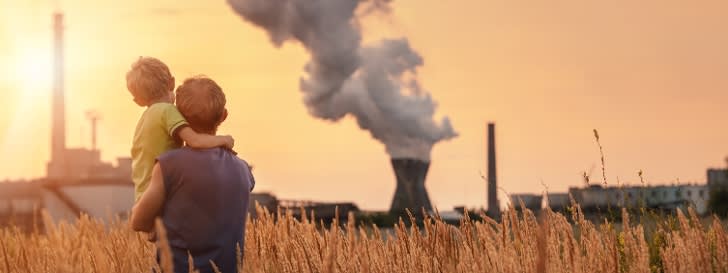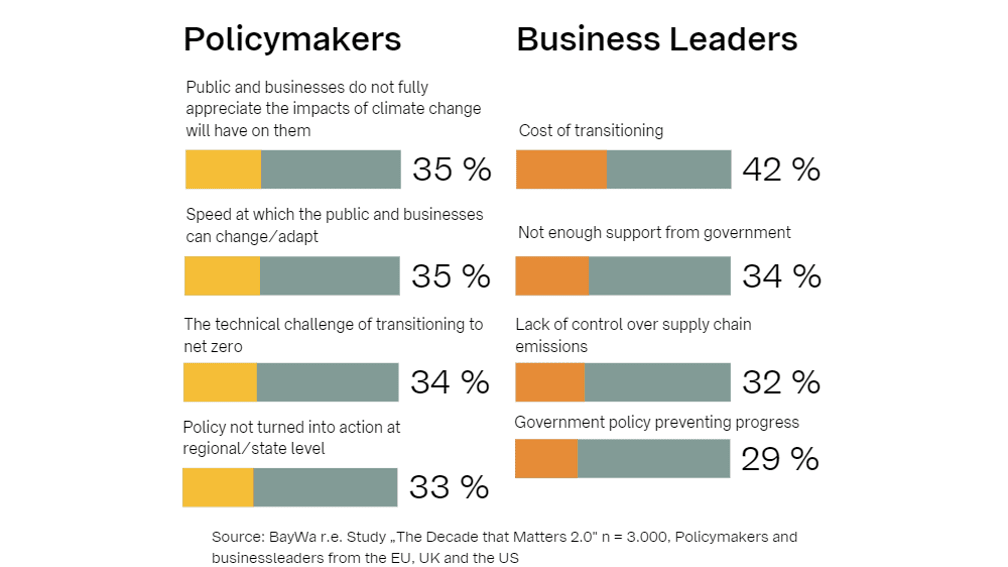
The Decade that Matters
Study: Consequences of the Ukraine War for the Expansion of Renewables and the Biggest Obstacles on the Way to the Net Zero Target
According to BayWa r.e.'s representative study "The Decade that Matters 2.0", the pressure to act in the climate crisis is well known among the public, politicians and companies, but decision-makers nevertheless fear a delay in achieving the net zero target (= net zero greenhouse gas emissions). The study explores possible reasons for this and also asks about the effects of recent crises on the expansion of renewable energies.The most important facts in brief:
- BayWa r.e. surveyed 3,000 corporate and political leaders in the EU, the UK and the USA. In addition, public discourse was analysed with the help of social listening tools.
- In the public debate, there is less and less talk of "global warming" and "climate change" and more and more talk of "climate crisis", reflecting the urgency of the issue.
- Recent crises in the last year have spurred the development of renewable energy: 96% of all companies surveyed plan to purchase renewable energy and over half (53%) further developed their own sustainability strategy.
- Nevertheless, almost half of the corporate decision-makers worldwide (47 %) expect the net zero target to be delayed by two to three years due to the Ukraine war.
- In Germany, companies consider costs (44 %) to be the biggest obstacle on the way to the goal. Political decision-makers are more likely to cite technical hurdles and the speed of adaptation by companies and the public (35 % each).
"Fast is no longer fast enough": Public debate reflects pressure to act
BayWa r.e. published its first study back in 2021, focusing on analyzing the public debate surrounding the climate crisis. Two years later, its thrust is more topical than ever, as is clear from the terms circulating in the public debate. The study's creators used social listening tools to track how conversations about climate were changing. Toward the end of the 2010s, the term "climate change" displaced the buzzword "global warming" in online discourse. In 2019, "climate change" dominated conversations online, with six million mentions per month. However, since 2020, the more urgent "climate crisis" has been on the rise. This means the public is aware of how much the situation is getting worse, and with it the pressure to act.
Decision-makers in politics more optimistic than in companies
As part of the study, Censuswide surveyed 3,000 political and corporate executives in the EU, the UK and the USA on behalf of BayWa r.e.. The discrepancy between companies and politics is astonishing. Decision-makers in politics are optimistic about the complete switch to renewable energies in their respective countries: more than half of all respondents worldwide (58 %) are confident that the switch can be achieved by 2050. Far fewer, only 11%, believe that this will not be the case until after 2050, and only 1% think it is impossible. On the part of the business community, the picture of opinion is more pessimistic. Here, only a quarter of the decision-makers surveyed consider the complete switch to renewables to be possible by 2050. A good 32% believe that this will not be the case until after 2050, and 8% consider it impossible.
What are the biggest hurdles on the way to the net zero target?
Politicians and companies are also at odds on this issue. These are the most frequently cited reasons from the survey worldwide:
Ukraine war: simultaneous expansion of renewable energies and dependence on fossil fuels
The war in Ukraine has fueled the climate crisis in two ways. On the one hand, it has accelerated the shift to renewable energy, and on the other, it has increased short-term dependence on fossil fuels. Globally, 47% of respondents from companies around the world fear a delay of two to three years in reaching the net zero target due to the war.
Despite economic uncertainty: Now is the time to invest
According to the study, it is now more important to develop new habits than to break old ones. This is evidenced by how governments and businesses, even in times of economic uncertainty, are no longer just preparing for a clean future, but are willing to invest in it. They are actively seeking to transition to renewable energy sources and recognizing the opportunities it presents - in line with a public that is moving from debate and discussion to direct action. Companies that simply turn off the spigot in response to economic turmoil risk falling behind and even losing public support.

